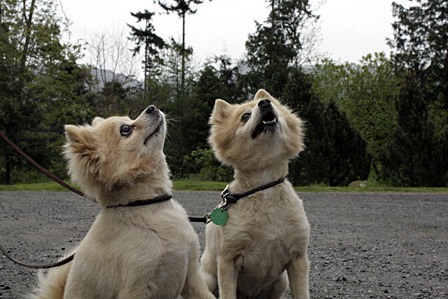Because your treadmill can’t bark, shake paws, or look at you with warm, melting brown eyes.
The Orcas Animal Protection Society, in partnership with North Cascade Cardiology, is encouraging cardiac patients to hop off the treadmill and head to the animal shelter instead, where lonesome pooches are ready to tag along for a walk. The clinic has partnered with the animal shelter to help patients fill their prescriptions for exercise with friendly, furry company and fresh air, instead of inside hospital walls. The exercise reduces risks of new cardiac events, high blood pressure or cholesterol, and depression. And the socialization helps the dogs stay comfortable with human handling, giving them a better shot at successful adoption to a permanent home.
“Marsha (Waunch) was the inspiration behind it,” said Cascade Cardiology CEO Jerry Marschke.
Waunch, the shelter manager, had read about a similar Wisconsin-based program in Purina’s Rally to Rescue magazine.
“I thought, what a great idea, because it’s so important not only for the dogs but for people with cardiac issues, or people who are going through physical therapy and need to do some walking. Sometimes that’s kind of boring if you do it by yourself. It can be much more enjoyable and social.”
Waunch said the shelter will carefully match interested dog-walkers with appropriate dogs, making certain that the dogs are well behaved. The shelter currently has two tiny Pomeranians who are very easy to control, and sometimes has older dogs who would enjoy a leisurely stroll. The canine population is always changing, as new dogs come in and others find permanent homes.
“We never know, it’s always a surprise to us when something comes through the door,” said Waunch.
But when the Orcas dog supply runs low, the staff often contacts their off-island partner shelters and arrange to bring more homeless dogs to the Orcas. Waunch said the dogs need quite a bit more attention than the shelter’s dozens of cats, and volunteer dog walkers can provide that for them.
“The new program gets the dogs out of their kennels, which helps keep them happy and friendly,” said an NCC representative. “The exercise is beneficial for both the dogs and cardiac patients and is a lot more fun!”



